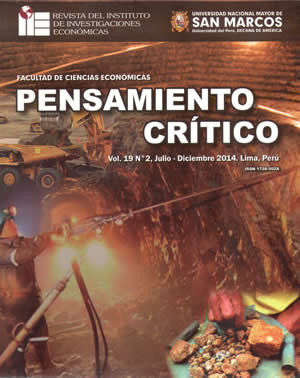Disharmonious will be no sustained growth
DOI:
https://doi.org/10.15381/pc.v19i2.11100Keywords:
income inequality, GDP per capita, Gini coefficient, management and public policy, capital and labor, equity, inclusion, globalization, neoliberal policiesAbstract
Traditional and marked difference between the rich North and the poor countries of the south, from about 1990 is disappearing more and more. That marked divergence between the increasingly rich and getting poorer countries, which began with the industrial revolution and colonialism in the early nineteenth century, is being reversed by a new convergence.
Today is producing a structural change in the dynamics of the global economy, this new addition to the fast convergence behavior of the rate of economic growth per capita in emerging and developing countries is higher than in developed countries and tends to homogenize the global per capita growth, but these countries have been able not unlink, strong cyclic correlation trend around and have not been able to isolate the effects of the increasing divergence in inequality in the distribution of income between rich and poor.
The 85 richest people in the world now own more than half of the available wealth inequality in income distribution is diverging, harnessing and perpetuating an unprecedented rate worldwide (even though the overall average income is converging), leaving a growing it is «morally wrong» is also shown to slow the rate of growth of countries printing. Although in this article we focus on the overall income inequality, this is often associated with other inequalities also affect globally and could eventually be even more important (lack of access to food, water, health, education, etc.).
Capital ownership is more concentrated than the distribution of income; 10% of the population of the OECD have more than 50% ownership, on the other hand 50% of the population has no property, but if you are in debt.
Downloads
Published
Issue
Section
License
Copyright (c) 2014 Jorge Barrera Herrera

This work is licensed under a Creative Commons Attribution-NonCommercial-ShareAlike 4.0 International License.
THE AUTHORS RETAIN THEIR RIGHTS:
a. The authors retain their trademark and patent rights, and also on any process or procedure described in the article.
b. The authors retain the right to share, copy, distribute, execute and publicly communicate the article published in Pensamiento Crítico (for example, place it in an institutional repository or publish it in a book), with recognition of its initial publication in Pensamiento Crítico.
c. The authors retain the right to make a subsequent publication of their work, to use the article or any part of it (for example: a compilation of their works, notes for conferences, thesis, or for a book), provided they indicate the source of publication (authors of the work, journal, volume, number and date).






